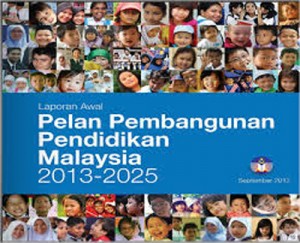
SHAH ALAM AUGUST 27th: The Combined Action Commission (Gabungan Bertindak Malaysia, GBM) has urged the government to gazette the Education Development Plan (PPPM 2013-2025) final report immediately, and delay the white paper implementation plan so as to allow the people an opportunity to provide final feedbacks
The GBM, which consists of 25 non-governmental organisations (NGOs), said they had delivered a 10-page memorandum to the government about the PPPM 2013-2025 last November 29th 2012.
“In the memorandum, we welcomed the Ministry of Education’s initiative to prepare a white paper that is all-inclusive and integrative.”
“Based on our understanding, it was aimed for the development and well-being of the entire nation’s education sectors, including religious studies.”
“We wish to voice our concerns because the education’s white paper was finalised without taking into account the findings and recommendations of civil organisations,” said the GBM in their media statement.
According to the statement, various important aspects of the concerns were addressed on the white paper, such as the national teaching philosophy, and both vocational and vernacular educations.
This also includes language teaching, student dropout issues and the teachings of history, geography, and literature.
“We plead with the Ministry of Education to consider extending the consultation deadline on the white paper so that the civil society organisations can be given the opportunity to review the revised draft,” said the statement.
The statement also revealed that the government will continue with their effort to implement the white paper.
A recent statement by the first Minister of Education, Tan Sri Muhyiddin Yassin, hinted that the PPPM will be launched this coming September 6th. The launch will not be delayed despite opposition from various parties.
“The GBM will not support and endorse the development of education in which, according to the Ministry of Education, contains 17,000 recommendations for change without reference to the final copy.”
“It is imperative to ensure that the 17,000 proposals for change are based on the principles of justice, equality, and inclusiveness across all ethnic boundaries and benefiting all educational institutions and communities.”
“The betterment of our young generation’s education deserves careful and meticulous considerations; not hasty policy-making and short-sighted implementations,” the statement concluded.
– MZA